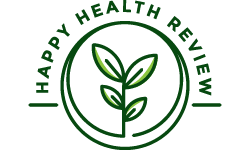Best Supplements for Anxiety Backed by Science
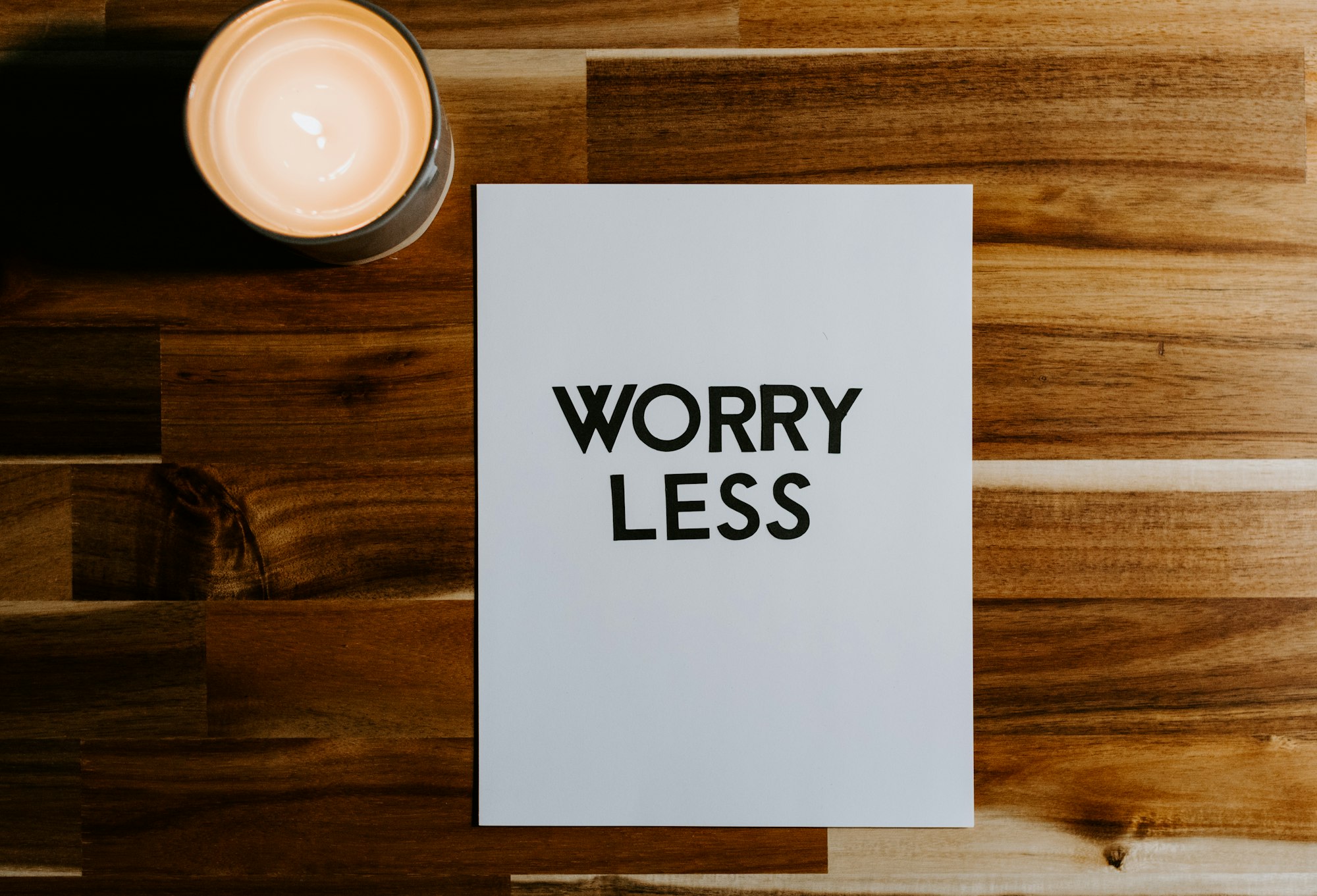
Anxiety disorders affect millions of people in the United States each year. Anxiety can take many different forms. It can cause panic disorder, stress, and worry.
According to the Anxiety Depression Association of America, GAD affects approximately 6.8 million adults in the United States. Other anxiety disorders include specific phobias and panic disorders.
There is the various treatment for anxiety disorders including therapy, meditation, yoga, essential oils, and herbal supplement. Natural supplements are effective supplements that can help with everyday anxiety. However, some supplements may be unsafe or ineffective.
According to the National Institute of Health (NIH), passion flower is an anxiety remedy that doesn't have any side effects. However, alternative medicine for anxiety does show promise in helping with anxiety relief. They're safe, as backed up by science.
MegaFood Vitamin D3 5000IU

Vitamin D3 is an effective supplement for mood and brain health. Studies have shown that low levels of vitamin D are linked to depression, suggesting that supplementing with vitamin D may help treat depression.
Research has suggested that having a vitamin D deficit may also be linked with anxiety. A 2015 review study reports that people who suffer from symptoms of anxiety or depression have lower levels of calcidiol, a byproduct of Vitamin D breakdown, in their bodies.
A 2017 study found that taking vitamin D supplements has anti-anxiety effects and depression in people with type 2 diabetes. A recent study in 106 people with major depression found that treatment with 1600 IU of vitamin D per day for six months led to significant improvements compared with a placebo-controlled study.
While higher doses of vitamin D supplements may be needed to treat deficiency, for most people who just want to maintain healthy vitamin levels, a daily supplement providing 1,000–2.000 IU per day may provide sufficient amounts.
There have been some studies suggesting that there may be a link between anxiety and vitamin d levels, but further research is needed to confirm these findings.
Your body makes vitamin D by exposing your skin to sunlight. You can get more vitamin D from spending more time in the sunlight, eating foods rich in Vitamin D — the main source of which is fatty fish such as salmon or mackerel — or taking vitamin D supplements.
It's difficult for people who follow vegetarian and vegan diets to obtain sufficient amounts of vitamin D from their diet.
2. Divine Bounty Super B Complex Vitamins
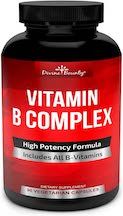
Vitamin B is a group of eight different vitamins that work together to manage various processes in the body, such as stress levels.
A 2017 study found that people with low levels of vitamin B- 12 were more likely to have anxiety or depression.
A 2018 study found that people who consumed foods high in B vitamins (in this case, yeast-based spread) had better anxiety and stress levels than people who did not consume these foods. This was more pronounced when fortified with vitamin B- 12.
Taking B complex supplements may be helpful for people who need extra B vitamins. You can usually get enough vitamin B from eating a variety of healthy foods.
Most B vitamins, including vitamin B-12 and riboflavin, usually occur in animal-based foods. Because of this, people who follow a vegetarian or vegan diet might need to obtain these nutrients from other sources.
3. Nature’s Bounty Magnesium

Magnesium is an essential mineral needed for the proper functioning of most systems in the human body.
A 2017 clinical trial looked at the results of 18 studies. Researchers found that magnesium supplementation may help improve measures of anxiety in vulnerable people, but the quality of evidence is not yet strong enough to recommend them for widespread use.
A short 2016 review study reports that people who suffer from anxiety-related to PMS benefited from taking magnesium supplements.
Magnesium can be obtained from dietary sources or as a supplement for anxiety. High magnesium foods include whole grains and dark-green, leafy vegetables. Taking too much magnesium can cause diarrhea. Start with a low dose, such as 100 mg. Do not exceed 350 mg of sodium per day without a doctor's approval.
4. Integrative Therapeutics L-Theanine
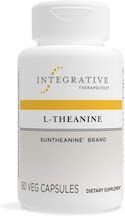
It's an amino acid that occurs naturally in black and green tea leaves. It may be a mild sedative and an anti-anxiety agent, but there isn't enough evidence to say for sure.
A 2016 double-blind study found that people who consumed a drink containing 200 mg of L-Theanine had lower stress responses and cortisol levels after undertaking an exhausting task than those who took a placebo.
L-Theanine supplements have also helped reduce anxiety symptoms in people who suffer from mental health issues and major depressive disorder. Start with the lowest dose of l-theanine. Capsules usually contain 200 mg of active ingredients. You shouldn't exceed 400 mg of caffeine without first talking to your healthcare provider.
5. NATURELO Multivitamin - Vitamins & Minerals

A multivitamin supplement containing a wide range of vitamins may benefit people with anxiety disorders. A study found that a supplement containing these nutrients was effective at reducing anxiety in healthy people.
A 2018 study reports that multivitamin supplements might help people with mood disorders such as panic attacks, anxiety, depression, and bipolar disorder.
Each brand of multivitamin has a different composition of ingredients. Ask a medical provider or pharmacist for advice about which may be best for you.
6. Nordic Naturals ProOmega 2000 mg

Omega-3 fatty acids are powerful anti-inflammatory agents and may be helpful for people with anxiety. Omega-3 fats are found in foods such as fish, flaxseed, and walnuts.
They play an important part in brain health and mental illness, according to the Office of Dietary Supplementation (ODS). Fatty acids cannot be made by the body, so they must be obtained through the diet.
A 2018 systematic review found that mindfulness training was effective for reducing depression. A recent review suggests that a low intake of omega-3 fats may increase the risk of anxiety and/or depression.
Taking omega-3 supplements may help prevent or treat these disorders. However, the review found that significant anti-anxious effects were only reported in trials using at least 2,500 mg of omega-3 fats per day.
Omega-3 supplements may interact with certain medications, including anticoagulant drugs. Before taking any omega-3 supplement, people should ask their doctor if they have any existing medical conditions or take any prescription medications.
7. NOW Supplements, Valerian Root
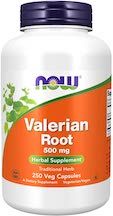
Valerian has long been used as a medicinal plant for thousands of years.
Valerian may induce vivid dreams because it contains some essential oils and compounds called iridoids. These compounds stimulate the production of opioids and serotonin in your brain, which produces relaxing and anti-depressant effects.
However, more research needs to be done before we know whether it is effective. As yet, there are no studies that prove that using valerian root for long periods is safe.
A 2017 double-blind study compared the effects of valerian and placebo on 49 menopausal women and concluded that those who took the supplement reported lower levels of anxiety.
Women undergoing a medical procedure found those who took acid in valerian root experienced less anxiety.
8. NOW Foods Saffron 50mg

Saffron is an intensely colored spice that has culinary and medicinal purposes. It has antioxidant compounds and may be particularly helpful for people who take anti-anxiety medications when taken as a supplement.
A 2018 review of a hundred studies found that safflower supplements help reduce anxiety in people. Some studies included in this review showed that treatment with safflower had similar anxiolytic effects when compared with the anxiolytic drug fluoxetine.
A 2016 study on 60 people who had depression and anxiety showed that taking 100 mg of safflower extract daily for 12 weeks significantly improved their symptoms compared with a placebo. The supplement was also tolerated by the participants.
However, pregnant women should speak with their doctors before taking saffron supplements, as there may be adverse effects such as uterine contractures.
Each NOW saffron capsule contains 50 milligrams of saffron, which is recommended to be taken twice daily or as directed by your health care professional.
9. Bigelow Cozy Chamomile Herbal Tea
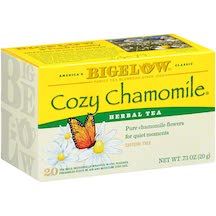
Chamomile is an herbal extract that has been used to calm anxiety and stress for thousands of years. Research shows that chamomile tea has anti-anxiety effects.
A study in 93 people with mild to moderate generalized mental illnesses such as anxiety disorder found that taking 1,500 milligrams of pharmaceutical-grade chamomile extract daily for 26 weeks as treatment for anxiety disorder significantly reduced their anxiety symptoms, compared with placebo.
However, if you're pregnant or allergic to ragweed, chrysanthemum, marigold, or daisy plants, you should avoid taking chamomile supplements due to potential safety concerns.
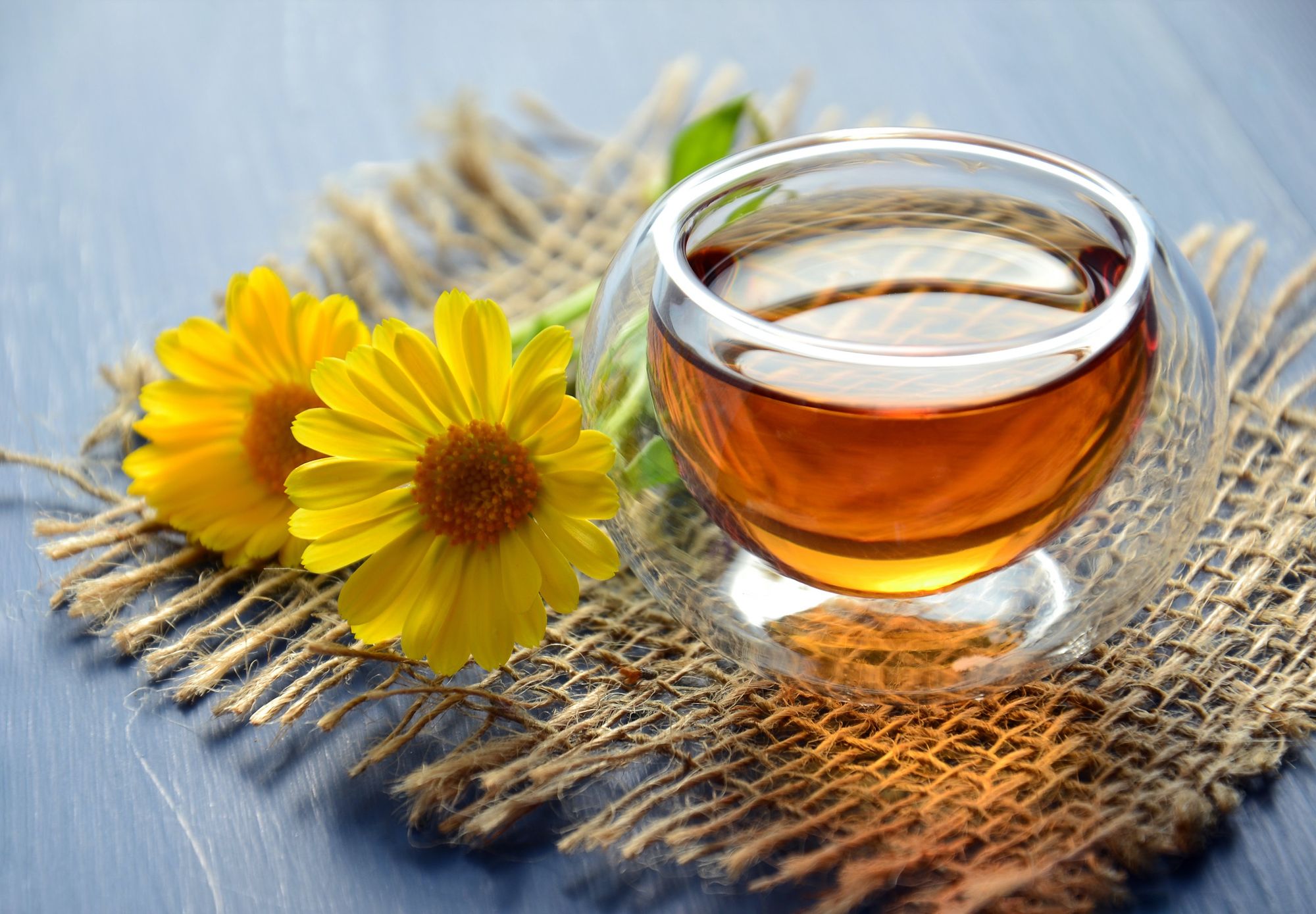
Chamomile supplements may interact negatively with certain medications, including those used for treating anxiety, so it‘s important to consult your physician before taking chamomile supplements.
They also say that the research community doesn't know much about chamomile's effects on anxiety yet because scientists haven't studied it to a reliable enough degree in humans.
A 2016 study concludes that people who took chamamille extract for eight weeks experienced a reduction in their symptoms of a generalized anxiety disorder (GAD). It had a similar stress response to those of an anti-depressant. The participants took 1.5 grams of chamomile each day.
A randomized study found that people who took 500mg of chamomile extracts three times per day had less anxiety than those who took a placebo. You can take chamomile supplements, use chamomile essential oils, or drink chamomile tea.
10. Lavender Essential Oil
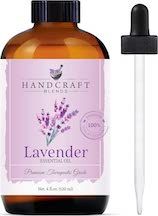
Some people think that the scent of lavender is relaxing. Some evidence suggests that smelling this herb can help ease anxiety. A recent study found that using lavender oil or a lavender foot bath may help reduce anxiety and stress in expectant mothers.
A found that people who used lavender aromatherapy before surgery were less anxious than those who did not use it. You can inhale lavender oil by using an essential oils diffuser. They may also add lavender essential oil to their skin after diluting it in a carrier oil such as coconut or olive oil.
11. Herb Pharm Organic Lemon Balm Extract

Lemon balm is an herb that has leaves with a lemony fragrance. It is related to peppermint and is a popular calming herb.
A 2016 study found that Melissa officinalis (lemon balm) tea improves anxiety symptoms and sleep quality for people who have experienced burns.
A 2019 double-blind study looked at people who recently had heart bypass surgery. People who took capsules containing 1 gram of dried lemon balm daily had lower anxiety levels than people who took a placebo.
Final Thoughts
Anxiety is a common mental health condition. Fortunately, anxiety disorders such as Obsessive-Compulsive Disorder (OCD) can be managed with therapy and alternative treatments, including supplements.
Research suggests that some dietary supplements may help with the management of anxiety, and reduce stress, including magnesium, vitamin B12, vitamin D, saffron, omega-3s (EPA and DHA), chamomile, and l-theanine.
Natural medicine is not the only way for people to manage their anxiety. People who suffer from mental disorders may also want to try herbal medicines, meditation, yoga exercises, deep breathing techniques, or regular exercises as remedies for anxiety to help them cope with their symptoms.
Before taking any natural vitamins, talk with a doctor first. You shouldn't stop taking anxiety medication without a doctor's approval.
